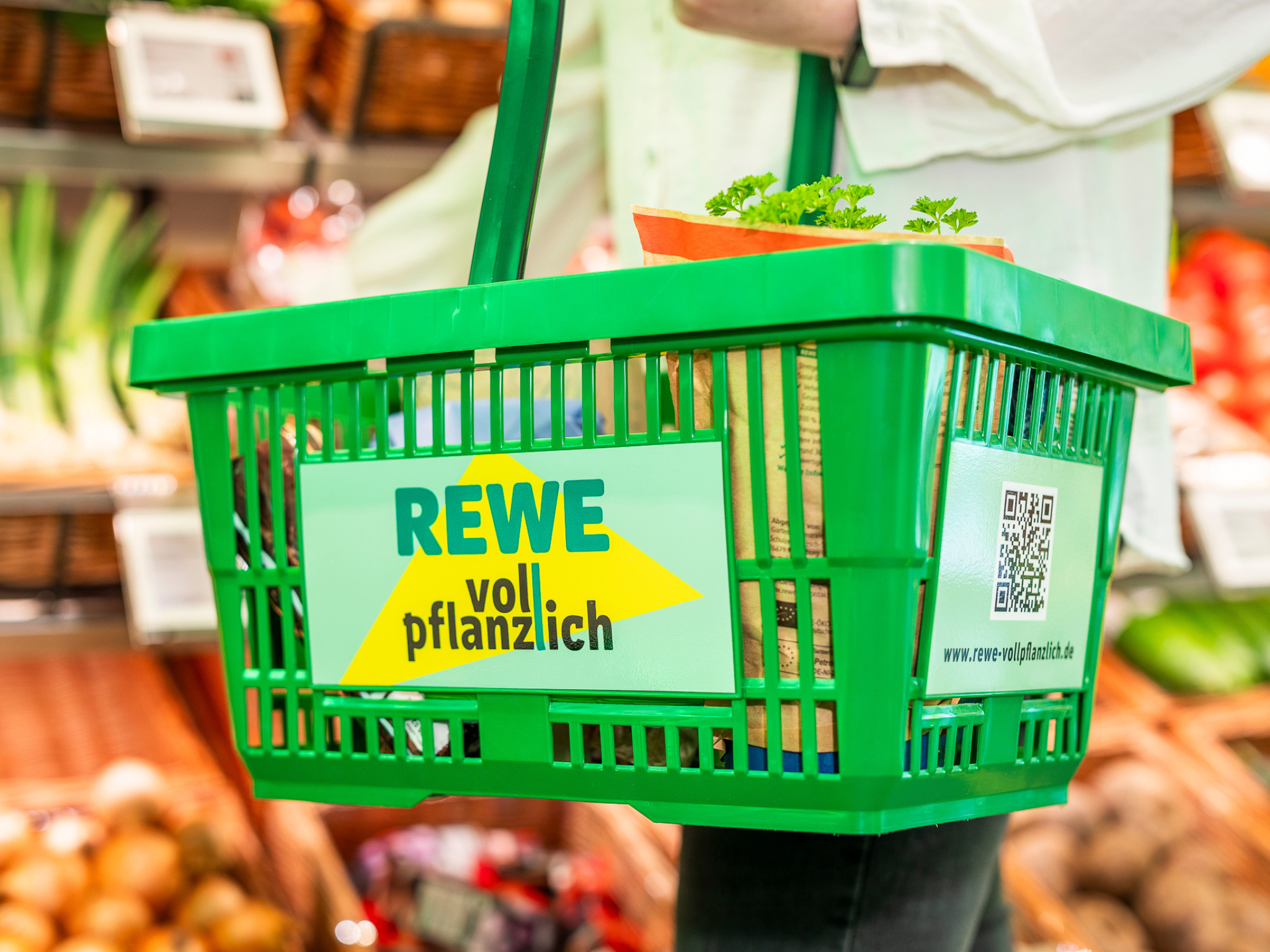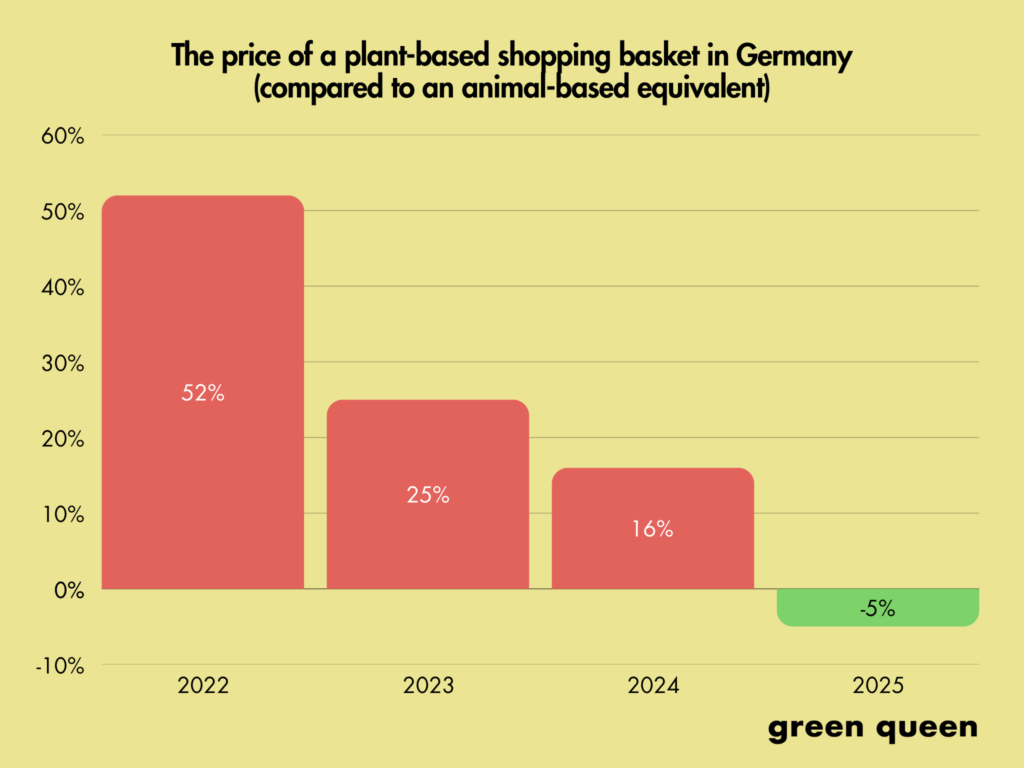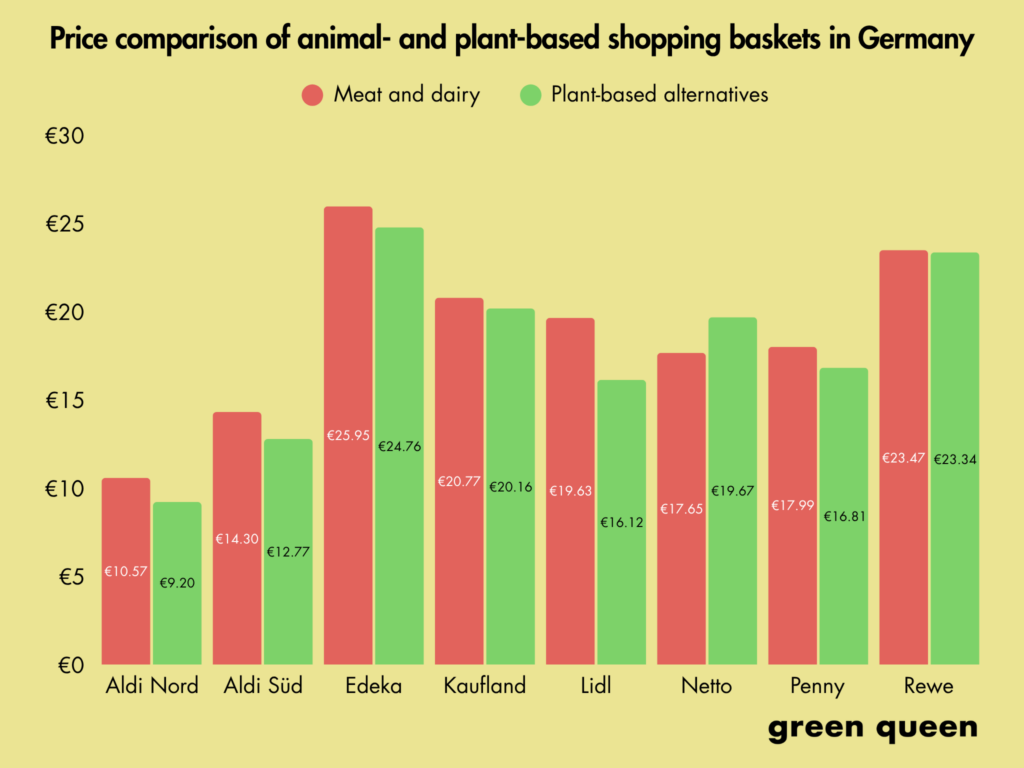
In Germany, a vegan shopping basket is now 5% more affordable than one with meat, dairy and seafood, reversing a trend that has long plagued the adoption of plant-based alternatives.
Following a year when sales of plant-based food rose by 1.5% (compared to much wider losses in other markets), and consumption of meat and milk hit historic lows, Germany is now offering a further incentive for people to eat vegan.
In the era of inflation, the cost of plant-based alternatives is now lower than meat, dairy and seafood across seven of the country’s eight biggest supermarkets.
The data, compiled from 153 stores by ProVeg International, reveals that a vegan shopping basket is 5% cheaper than one containing animal products today. That’s a big shift from 2024, when the former carried a 16% price premium.
Lidl, which has pledged to increase its share of plant-based food sales by 20% by 2030, offers the best cost savings. The cheapest non-dairy and meat-free products here are 18% cheaper than their conventional counterparts. This is no surprise, given that the retailer introduced price parity for vegan products under its private-label Vemondo brand back in 2023, and the cost advantage of a plant-based basket was already 3% last year.
The only retailer where being vegan is more expensive is Netto, where meat and dairy alternatives are still 11% costlier.
“Within three years, the price ratio for plant-based shopping has reversed: what was once a 52% surcharge [in 2022] has become a 5% price advantage,” noted ProVeg market expert Virginia Cecchini Kuskow.

Plant-based milk more affordable everywhere, even with higher VAT
ProVeg found that half of the 12 plant-based categories assessed are cheaper than their animal equivalents, up from just a third in 2024. That rises to seven out of 12 at Edeka, Rewe, and Lidl. Even at Netto, five product segments are more economical than animal proteins.
Consistent with the previous two years, non-dairy milk is the only plant-based category less expensive across all supermarkets analysed, offering a nine-cent advantage over cow’s milk.
That said, the cheapest milk alternatives aren’t fortified with essential micronutrients or suited to coffee drinks, making them less nutritionally and functionally complete than dairy. Fortified or barista-style plant-based milks are usually much more expensive.
There is a caveat here. Cow’s milk only carries a 7% VAT in Germany, while plant-based milk suffers from a 19% surcharge. Retailers like Rewe have been calling on the government to introduce a more equitable tax rate, and if it does, private-label non-dairy milks will become significantly cheaper than cow’s milk, while the rest will likely reach parity.
Vegan burgers are also more wallet-friendly wherever they’re available, as are cold cuts, sausages, sliced cheese and schnitzels in seven of the eight supermarkets.
Yoghurt, fish sticks and cream cheese are the only products that are more expensive than animal-derived versions in all retailers – though the latter category saw the largest average price decrease this year (€2 cheaper than 2024). In fact, vegan mince and pizzas were the only categories where prices were hiked up this year.
The overall reductions in prices can usher in a big shift towards plant-based alternatives. A study earlier this year found that price parity is no longer enough – undercutting the cost of animal proteins is crucial for greater uptake of vegan products.
“Many people only turn to plant-based alternatives more frequently when they are significantly cheaper than animal products. The fact that the plant-based basket of goods is now cheaper on average is a strong signal that a plant-based diet can also be economically attractive,” said lead author Steffen Jahn.

Availability and pack sizes are key price levers
Aside from price, access to products is crucial for consumers to actually enjoy the benefits. ProVeg found that plant-based alternatives had an average availability of 75% in the survey period, indicating that many stores don’t carry a retailer’s full vegan range.
Some fare better than others. At Kaufland and Rewe, the average availability was 94%, while Aldi Süd (53%) and Aldi Nord (52%) were on the opposite end of the spectrum. In terms of products, plant-based milk (99%), cold cuts (98%) and sausages (93%) were the most readily available across Germany, which is Europe’s largest market for plant-based food.
The pricing of plant-based products is also significantly influenced by the packaging size, which is often smaller than animal proteins. For instance, vegan sausages are often available in 200g packs, but pork sausages can be found in 300-540g packs.
“The fact that the plant-based basket is, on average, cheaper is true under the condition of similar package sizes. However, if the price per kilo were considered without considering the packaging size, a different picture would emerge,” ProVeg said.
The organisation noted that the price of a plant-based basket is therefore particularly attractive for smaller households, but the benefits are less clear for more populated ones.

“Packaging sizes can significantly influence purchasing and eating habits,” said Cecchini Kuskow. “Oversized packaging should be avoided for animal products, while larger packages are perfectly acceptable for plant-based alternatives.”
ProVeg advised retailers to actively communicate the price advantages of plant-based alternatives, increase product availability, introduce larger packs and more SKUs, and optimise nutritional profiles.
It also called on the German government to reduce the VAT on dairy-free milk to 7% and work to permanently exempt vegan products from tax (aligning with the national dietary guidelines), support protein diversification and plant protein cultivation, and strengthen R&D capabilities through investment.
The ProVeg study comes weeks after research showed that climate-change-induced price hikes for meat mean plant-based analogues are now priced the same or cheaper in the UK.
The post Plant-Based Alternatives Are Now Cheaper Than Meat & Dairy Across German Supermarkets appeared first on Green Queen.
This post was originally published on Green Queen.